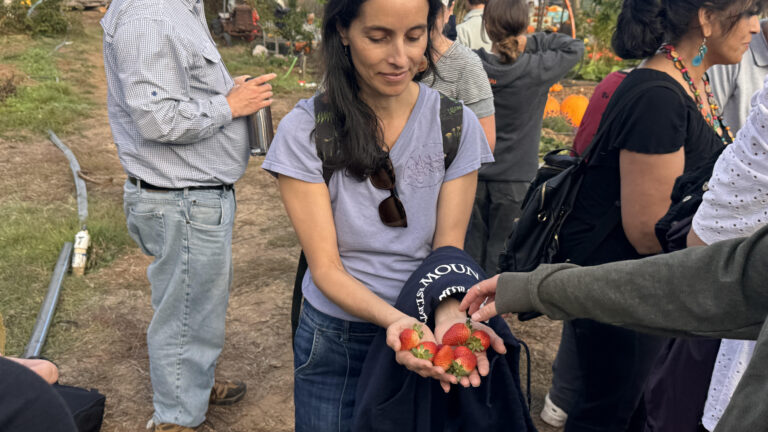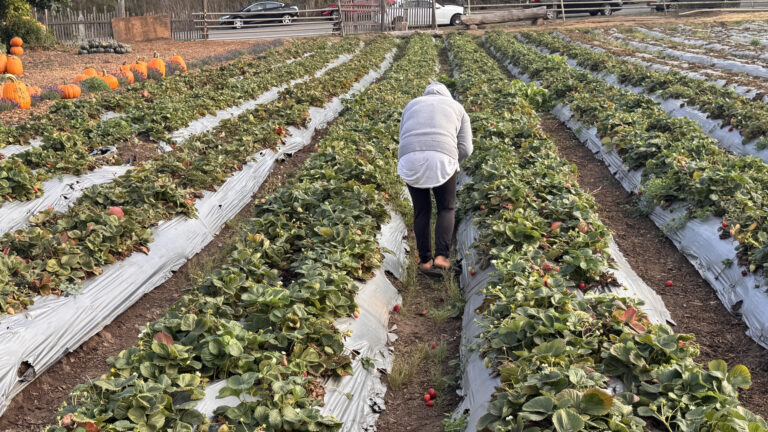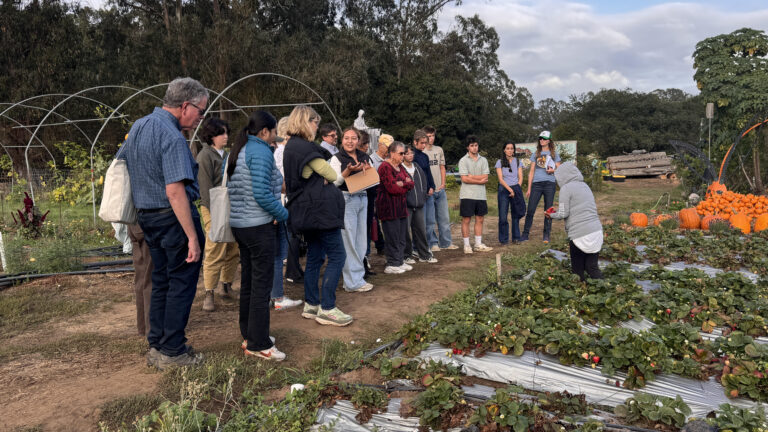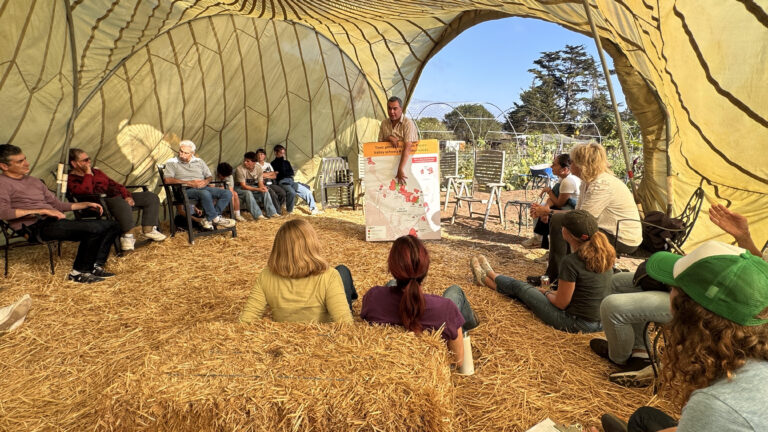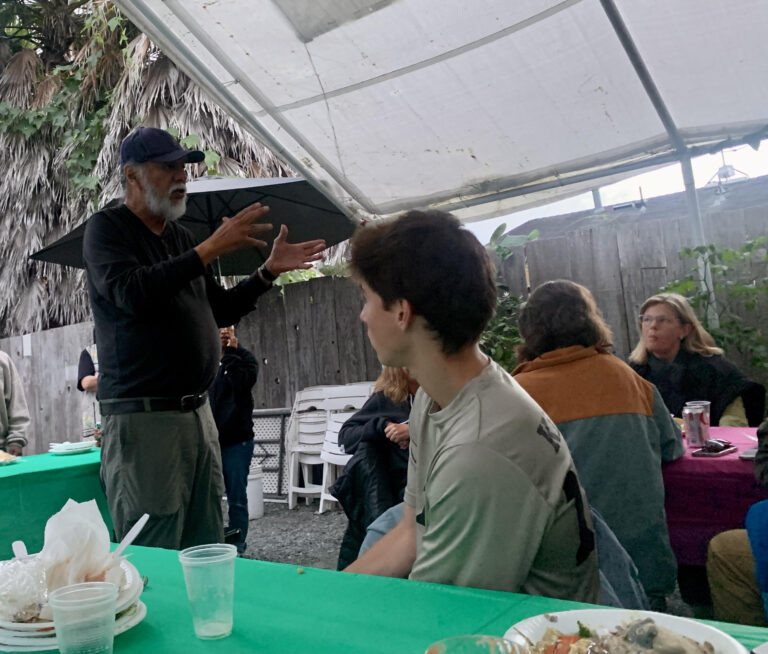Juniors Experience Farmworker Reality Tour
By Dr. Sangita Yolanda Diaz-Houston, MMS High School English Teacher
Edited by the MMS Junior class
Two cupped hands full of strawberries travel through a group of adults and students on an organic farm near the coast. The morning fog has dissipated. The sun shines down on arbors of squash, tufts of corn, and rows of green bushy plants. By the late afternoon in Santa Cruz County, the heat will beat down on thousands of people working in the fields. This area in and around the town of Watsonville is deemed the strawberry capital of the world. According to a recent county report, agriculture contributed more than $1.5 billion to the local economy in 2023 and supported nearly 12,000 jobs, directly and indirectly. This means that one in 18 jobs in the area is supported by agriculture.
On this particular afternoon a campesina, or field worker, is stooped over, demonstrating how strawberries are painstakingly picked by hand. She throws the fully ripe berries onto the ground since they can’t be sold. The berries which are kept are red tipped and milky white. They must be harvested before they fully ripen to facilitate longer shelf life. These are sampled by a tour group of about 30 people, including philanthropists from the Silicon Valley and the Mount Madonna School juniors and family members, who have all come to learn about the reality of being a farmworker in the fields of Santa Cruz County. Over the course of four hours, participants witness and hear testimony about the lived realities of those who bring food to our tables. This experience is offered by the Center for Farmworker Families, a non-profit based in Watsonville. The grassroots community organization is dedicated to enhancing the well-being of the farmworkers.
The woman tells the group that she has picked strawberries for 20 years since crossing the border at the age of 14 from her birthplace in Mexico. The Juniors watch in stunned silence as she describes the three nights and days she walked through the desert. “You could see the bones of people who didn’t make it on the ground,” she says. Her jug of water froze at night due to the cold, and the heat during the day was oppressive. According to the International Organization for Migration, the US Mexico border is the deadliest migration land route in the world, with hundreds of people dying every year.
When she arrived she looked for work, but would not be hired because she was a minor. They told her, “Go to school.” Days later, during a follow up activity in English class, Mount Madonna student Mariska Goldstein commented, “I had no idea how difficult and life threatening it is to make this journey.”
At the farm, the group hears from another female migrant farmworker who was denied an entire season of wages, $10,000, with no recourse. During the months of labor, she earned $1.60 per box of strawberries picked. When it came time to collect their wages, the employer simply told the workers that he wouldn’t pay them. “We looked everywhere for him. When we found him, he kept telling us that he didn’t have our money and that if we didn’t get off his property he would call the police.” There are no legal protections for workers that are undocumented. The vulnerability of these women to abuse in the workplace is tangible. Another student, Delmi McWilliams, commented that, “This would obviously be very illegal if done to a citizen, and it is also simply cruel and heartless.” As citizens we are guaranteed protection and have rights as workers that undocumented immigrants do not have.
The themes of belonging and identity are embodied by the personal testimonies of the campesinas; topics that are being explored at Mount Madonna School by the junior class. They began the year by reading Dear America, Notes of An Undocumented Citizen by the Pulitzer prize winning journalist Jose Vargas. In his memoir, Vargas recounts his journey to the United States as a child, only to discover when applying for a drivers permit that he was undocumented. To help bridge the undocumented world with our own, we are also reading excerpts of Gordo by Jaime Cortez. The book is based on his experiences growing up in Watsonville and at a migrant camp for fieldworkers near San Juan Bautista, which is only a short drive from Mount Madonna.
One of the goals of the curriculum is to foster empathy and understanding of the basic humanity that we all share. Junior Solomon Coleman reflected on the impact of the farmworker reality tour by saying, “We are lucky to have this opportunity for first hand experience, because as was said on the tour, ‘You can’t other someone you’ve met’.” In other words, you cannot dismiss the humanity of someone who you have connected with face to face.
After listening to the stories on the organic farm, we arrive at the Buena Vista Migrant camp next to the Santa Cruz County Dump. A caravan of cars with students and adults drives through rows of barrack style structures, each with stenciled numbers and letters identifying the small rectangular living spaces in each building. Children play on the bare ground and gather around a paletero (popsicle vendor) with a rainbow umbrella above his mobile freezer. The landfill looms large in the background with birds circling the piles of trash.
The caravan ends up at the home of Ernestina, a fieldworker, community organizer, mother and grandmother in downtown Watsonville. As we walk down the sidewalk, we laugh at a goat with corks on its horns that is frolicking on a trampoline, along with two small children, in the front yard adjacent. Along the side of Ernestina’s house leading to the back, a line of potatoes is popping up through the dark earth. There are tomatoes and other vegetables along the fence and a citrus sapling drips with round green orbs in a small pot. An enormous ancient maple tree leans over a canopy which covers several open tables with colorful plastic tablecloths. They are soon filled with plates of beans, rice, and fish that emerge from Ernestina’s kitchen. She comes out wearing an apron, her hair tied up in a handkerchief. Her little grandson has been roaming around and she sits him down with a fork. She places a piece of strawberry cake in front of him decorated with pink frosting roses.
It is here that we meet a young family that has been impacted by the use of pesticides in the fields. They speak Mixteco – an indigenous Mexican language, but speak in their second language (Spanish) which is then translated into English by an interpreter. The mother worked in the strawberry fields for several years, and then one day she started vomiting up blood at work. The doctors first said it was an ulcer, but then they later discovered it was stage one stomach cancer. She was pregnant with her son at the time, who is now running around behind the table with his sister. She sits in a chair with her husband standing beside her. They explain, “The doctors said it was bad luck, but we believe it was due to pesticide exposure.” In her village, they continue, none of their relatives or even extended family have a history of cancer. “She didn’t smoke or drink,” the father comments. “The dust in the fields made my eyes burn,” the mother states.
There is also concern for children who are exposed to pesticides at school, given that Watsonville is a highly agricultural community with no physical borders between the fields, homes, schools or public buildings. The Center for Farmworker Families is leading a campaign to convince agricultural companies to convert pesticide laden fields located next to or near schools to organic farming methods. According to the National Cancer Institute, the pediatric cancer rate for children 0-14 years old in Santa Cruz County is the second-highest in all counties in the state. At 22.5 childhood cancers per 100,000 children, the rate in our county is more than 38% above the overall California rate of 16.3 between 2017 and 2021.
The father goes on to describe the chemotherapy and the weight loss that came with his wife’s treatment, “She lost her hair and got very thin, but she was still beautiful to me.” The love in their family is deeply apparent. Junior David Monclus observed, “Even after all that had happened to them they didn’t look sad. They were a happy family that looked to the future.” They explain that the reason they are speaking up and risking exposure and scrutiny, despite their undocumented status, is so that others don’t have to go through what they went through. They encourage the community to get checked at the doctor, even though it is seen as a risk to do so.
Fear of arrest, detainment or deportation is a daily reality. Another student, Victory Gulizia, connected these stories to a local news article the class had recently read, “Watsonville Farmers Market Chilled by ICE Presence”. Recently, the number of people in the immigrant community going out on the streets has been reduced due to fear of immigration raids in Watsonville. Victory continued, “I want others in my community to know that field workers are not harmful. Instead of deporting them, we should accept them into our country and try to provide them with the resources they need to be able to survive and live a happy and safe life.”
Monthly at Ernestina’s house, a line of over 300 people stand patiently in the street waiting for toilet paper, shampoo, feminine hygiene products and other basic necessities. The Center for Farmworker Families also partners with Second Harvest Food bank to provide a bag of simple groceries. Steve Herrera, who sits on board for the Center, urged the tour participants to get involved in any way they can, and to put action where their heart is, ”We can all make a difference through advocacy and working for justice. The problems facing farmworkers may seem daunting, however nothing is as powerful as a small group of thoughtful committed individuals dedicated to changing the world.”
As we leave the verdant backyard, the sun is setting. Reflecting later in class, Romy Sirk-Traugh commented that she left with a deeper understanding of the hard work and sacrifice that make every meal possible. Students were asked what they wanted their community to know about this experience. Cameron King stated, “I want others to know that you should approach meeting new people with an objective and non judgemental view so that you can establish a better connection with that person.” The takeaway for the students includes this idea of listening and seeing others with an open mind and heart. The reason for doing so can be summed up in the final statement of the young immigrant father who shared his family’s story at Ernestina’s house, “We are all human and we all deserve to be loved.”


